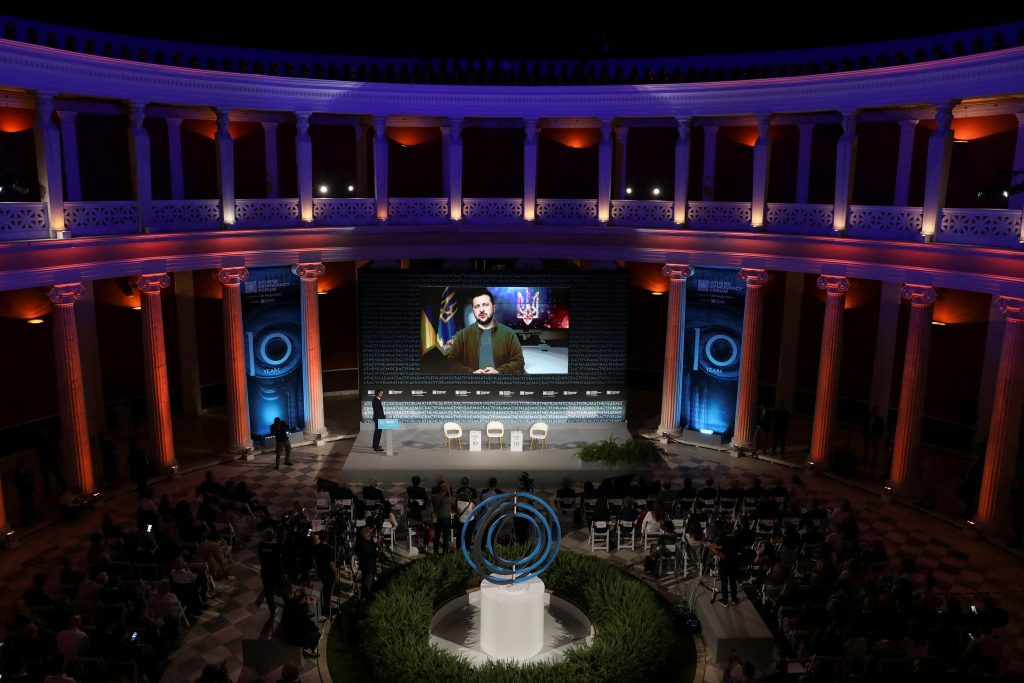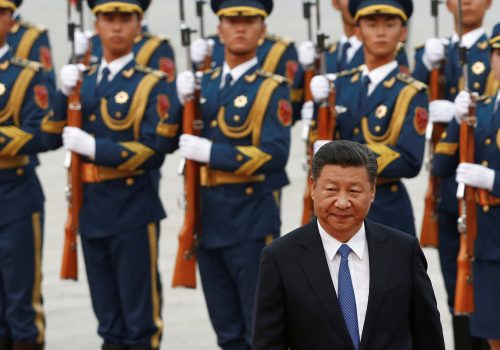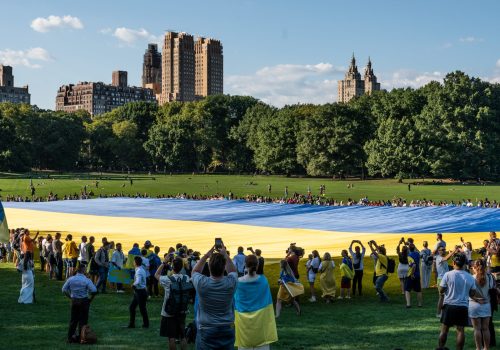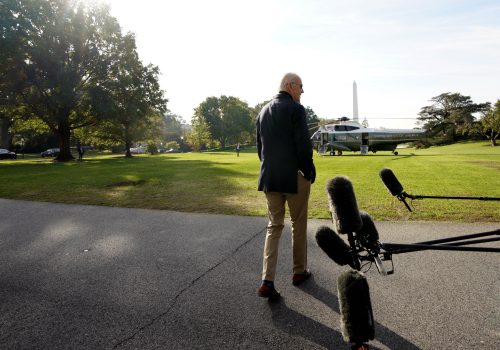The plot lines came together this week for the drama that will define our global future: the contest between economic progress and financial despair, between the rule of law and the law of the jungle, and between the civilized world and authoritarian tyrants.
What’s encouraging is that there is growing consensus among global leaders regarding the gathering dangers and their historic stakes, comparable to those of the 1930s ahead of World War II. What’s most disappointing is that common action is falling far short of this generational challenge.
For example, the International Monetary Fund-World Bank meetings in Washington underscored a rising consensus that escalating global inflation and a likely oncoming recession will grow worse if untreated, including rising dangers of asset price collapses, loan defaults, and Lehman Brothers-like creditor failures.
The US Federal Reserve and other central banks are taking dramatic steps to fight inflation, and policymakers were working behind the scenes this week to prevent fiscal crises like the United Kingdom’s from spreading. But they left Washington without a clear plan to tackle the worst-case scenario.
“We’ve got the most complex, disparate, and cross-cutting set of challenges that I think I can remember in the forty years I’ve been following this stuff,” former US Treasury Secretary Larry Summers told the Institute of International Finance this week. “And in all honesty, I think the fire department is still in the station.”
The Biden administration’s National Security Strategy (NSS), also released this week, intelligently underscored the escalating dangers of the global geopolitical contest with Russia and China at a time of domestic political divisions. However, it also fell short on the remedies and resources required to address that contest.
As if on cue, Russian President Vladimir Putin this week escalated his attacks on Ukrainian civilian targets, empowered by Kyiv’s continued lack of sufficient air-defense systems and inability to counterstrike the source of the attacks within Russia. And today marks the opening of Chinese leader Xi Jinping’s Communist Party Congress, which is expected to hand him a third five-year term of increasingly authoritarian rule.
Taken together, Putin and Xi are underscoring the ideological contest that defines our times. Both countries are driven by autocratic nationalism, but China’s is of an increasingly Marxist-Leninist nature.
“Under Xi, ideology drives policy more often than the other way around,” writes Kevin Rudd, the former Australian prime minister and one of the keenest observers of modern China. Writing in Foreign Affairs, Rudd says Xi has “stoked nationalism by pursing an increasingly assertive foreign policy, turbocharged by a Marxist-inspired belief that history is irreversibly on China’s side and that a world anchored in Chinese power would produce a more just international order.”
The West’s own wounds
Also in this remarkable week, there were new reminders of Western democracies’ self-inflicted wounds.
The US House of Representatives committee investigating the January 6 assault on the Capitol voted to subpoena former President Donald Trump following a sweeping summation of its case that Trump was at the center of an effort to overturn the 2020 elections that began before election day.
With midterm elections only three weeks off, US allies worry that the United States’ stubborn internal divisions make its current and future behavior on the world stage unpredictable at a time when greater consistency is so urgently required.
And in the United Kingdom, Prime Minister Liz Truss, hoping to halt the collapse of her political authority after only a month in office, fired Chancellor of the Exchequer Kwasi Kwarteng and scrubbed her tax-cutting package. Whether that settles financial markets or the rebellion within her own party remains to be seen.
It’s weeks like this one, when so many plot strands of the global future wind together, that have prompted writers and historians to quote Vladimir Lenin, who is reported to have said: “In some decades, nothing happens; in some weeks decades happen.”
Richard Haass of the Council on Foreign Relations adds an addendum: “there are also decades when centuries happen.” Haass believes we are in such a moment, which he calls “The Dangerous Decade.” He writes: “The frightening gap between global challenges and the world’s responses, the increased prospects for major-power wars in Europe and the Indo-Pacific, and the growing potential for Iran to cause instability in the Middle East have come together to produce the most dangerous moment since World War II.”
A question of leadership
The question is which leaders will define the years ahead? Will they be Putin, Xi, and their ilk, who lack both democratic constraints and legitimacy, or the likes of US President Joe Biden and Truss, who are so hamstrung by messy politics? Or could the example of Ukraine’s Volodymyr Zelenskyy inspire similar courage in others?
It’s fair to observe that we lack leaders of the caliber of US President Franklin Delano Roosevelt or UK Prime Minister Winston Churchill, who shaped the 1930s through World War II. However, what’s too often forgotten is that they also managed to galvanize their people against autocratic challenges while working through democratic means.
In releasing his NSS, Biden put it plainly: “Autocrats are working overtime to undermine democracy and export a model of governance marked by repression at home and coercion abroad.”
Mercifully, however, the NSS departed from the administration’s earlier predilection to group all non-democracies together. Though it doesn’t say it this way, there’s a greater recognition that Singapore isn’t North Korea, that the United Arab Emirates isn’t Iran, and that Saudi Arabia isn’t Putin’s Russia.
The NSS put it this way: “Our goal is clear—we want a free, open, prosperous, and secure international order.” To achieve that, according to the NSS, requires “three lines of effort. We will: 1) invest in the underlying sources and tools of American power and influence; 2) build the strongest possible coalition of nations to enhance our collective influence… and 3) modernize and strengthen our military so it is equipped for the era of strategic competition with major powers…”
What it fails to say is that all bets are off if the civilized world doesn’t first defeat the bear at the door. Ukraine must succeed in pushing back Putin, and Putin must fail in his delusional and imperial ambitions.
All else that is imagined in the NSS could fail if the civilized world doesn’t provide sufficient arms, sanctions, and political will to succeed at this. One place to start: Western nations can change their laws so that the three hundred billion dollars in Russian assets currently frozen in the international financial system could be repurposed to help Ukraine rebuild. What’s been achieved thus far is impressive, but it remains insufficient when measured against the historic stakes.
If the civilized world falls short, this could be its final act.
Frederick Kempe is president and chief executive officer of the Atlantic Council. You can follow him on Twitter @FredKempe.
THE WEEK’S TOP READS
#1 United States National Security Strategy
THE WHITE HOUSE
This is big.
The US National Security Strategy released this week, while not without its flaws, brilliantly and tersely captures our global challenges and what to do about them.
Atlantic Council experts weigh in and grade the NSS here. Writes Matt Kroenig, acting director of our Scowcroft Center for Strategy and Security: “Overall, this is a fine strategy. Several of the key themes are similar to those that have appeared in Atlantic Council Strategy Papers over the past several years. The NSS recognizes the preeminence of the China challenge, the superiority of democracies in great-power rivalry, and the need to stitch together US alliances in Europe and Asia and to create new frameworks to address twenty-first century challenges.
“On the negative side, there is a potential gap between ambition and resources. The strategy prioritizes amorphous global challenges over concrete security threats; it is too optimistic about cooperation with China; and the section on strengthening the United States for strategic competition includes too many divisive domestic political issues.” Read more →
#2 World Economic Outlook, Report October 2022: Countering the Cost-of-Living Crisis
INTERNATIONAL MONETARY FUND
The language in the IMF’s twice annual outlook is blunt: “Risks to the outlook remain unusually large and to the downside. Monetary policy could miscalculate the right stands to reduce inflation. Policy paths in the largest economies could continue to diverge, leading to further US dollar appreciation and cross-border tensions. More energy and food price shocks might cause inflation to persist for longer…”
That language reflects the mood in Washington this week among global economic and financial leaders. Their off-record comments to me reflect a growing consensus on the rising global financial and economic dangers and a lack of common cause regarding their solutions.
Hold onto your seats. Read more →
#3 How Ukrainians define their enemy: ‘It’s not Putin, it’s Russia’
David Ignatius | THE WASHINGTON POST
Readers of this column already know David Ignatius is both a friend and, in my view, the finest foreign affairs columnist of our times. He’s at his best when he’s traveling on the front lines of historic challenges, as he did when delivering this week’s column from Kyiv.
“I kept asking Ukrainians a question that vexes me: Is your war against President Vladimir Putin—or against Russia itself? Nearly every time, I got the same unyielding answer. The enemy is a Russia that must be defeated and transformed.” Read every word of this one to learn why Ukrainians believe Russia needs to go through the same process of change that Germany did after World War II. They may know best. Read more →
#4 The World According to Xi Jinping
Kevin Rudd | FOREIGN AFFAIRS
It’s hard for Americans to believe that their major global competitor and adversary might be motivated by an ideology as arcane and outdated to them as Marxism-Leninism.
However, if we are to prevail in this competition, every US official and legislator ought to read this piece reflecting on the ideological drivers behind Chinese President Xi Jinping as he opens his party congress today, which is likely to anoint him for a third five-year term.
“Within the Chinese system,” writes Rudd, “Marxism-Leninism still serves as the ideological headwaters of a world view that places China on the right side of history and portrays the United States as struggling in the throes of inevitable capitalist decline, consumed by its own internal political contradictions and destined to fall by the wayside. That, in Xi’s view, will be the real end of history” Read more →
#5 The world divided: The world China wants
THE ECONOMIST
The Economist is at its best when it takes on a giant issue defining our times and then throws the weight and intellectual heft of its team to tackle it. That’s the case with this special report focusing on what it is China wants, how it intends to get it, and why China may succeed. It makes for unsettling reading.
What China wants “is more subtle than Russia’s brazen defiance, yet more disruptive,” writes the magazine. “Under Xi Jinping… China is working to reshape the world order from within. When its efforts meet resistance, it pushes for vaguer rules whose enforcement becomes a question of political bargaining. All too often, it seeks to revive old, discredited ways of running the world that put states first, at the expense of individual freedoms.”
The Economist reminds us that seventy years ago, at the United Nations’ founding meetings, Soviet-bloc delegates “sought an order that deferred to states and promoted collective rather than individual rights, opposing everything from free speech to the concept of seeking political asylum…”
In the late 1940s, the free world outvoted communist countries. China now “seeks to reopen these old arguments about how to balance sovereignty with individual freedoms. This time, the liberal order is on the defensive.” Read more →
Atlantic Council top reads
Image: People watch as Ukrainian President Volodymyr Zelenskyy is seen on the screen as he speaks, during the Athens Democracy Forum, at the Zappeion Hall in Athens, Greece, September 28, 2022. (Photo by Louiza Vradi/Reuters)



